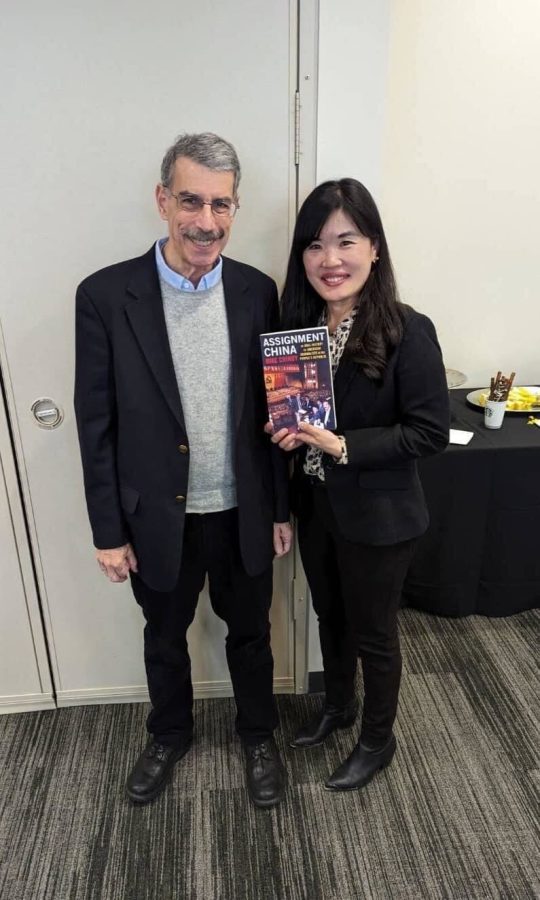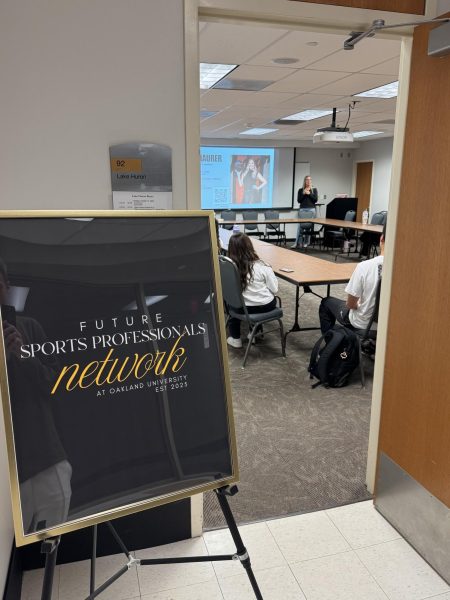Veteran CNN correspondent describes challenges of covering China during Klein Center lecture
Photo courtesy of Chiaoning Su
Chinoy and Su at the Klein Center event Friday.
The Klein Center for Culture and Globalization welcomed Mike Chinoy to Oakland University on March 31 to discuss his experience covering U.S.-China relations, the history of journalism within China and to promote his new book “Assignment China.”
Chinoy is currently a non-resident senior fellow at the U.S.-China Institute at the University of Southern California. His experience spans 40 years, including 24 spent at CNN, serving as their first Beijing bureau chief and senior Asia correspondent.
Klein Center Director Chiaoning Su introduced Chinoy and gave those in attendance background for the importance of the event and the book itself.
“In the field of journalism, we often say that it is the journalists who write the first draft of history,” Su said. “This book really elaborates on that draft by providing fascinating insight into the challenges of recording China over the past several decades.”
The first part of the event focused on Chinoy’s experiences on the job and the ever-changing relationship of journalists between the U.S. and China. He highlighted multiple journalists who have made an impact, such as Joseph Kahn, Fox Butterfield, Melinda Liu and Richard Bernstein.
Going through history, Chinoy summarized the peaks and valleys of journalists’ ability to get into China. He cited the Beijing-held 2008 Summer Olympics as ushering in the country’s most open era and the reign of Mao Zedong its most restricted — and indicated things may be headed back in that latter direction.
“Xi Jinping has really dramatically tightened the controls — he’s reimposed much stronger ideological criteria on everything,” Chinoy said. “But now, this is kind of hunkering down, closing the doors, and the diplomatic goal is not to be part of the international system, but to reshape the international system.”
“Assignment China” is preceded by a documentary-style film series of the same name, available to view on the USC U.S.-China Institute’s channel.
Chinoy concluded the Klein Center event by taking questions from the audience on ways to counter propaganda, whether there is scrutiny on what information can be taken out of China and how the people of China are able to access truthful information.
After the event, The Post was able to sit down with Chinoy to discuss current events and issues — such as the ongoing debate surrounding the movement to ban TikTok. Chinoy said a ban may be tricky for legal reasons, but he is unsure about the solution.
“There is no question that if the Chinese security services want to target a specific person, they have the ability to lean on TikTok’s parent company, which does not have the ability to push back,” Chinoy said. “The potential for abuse by the Chinese authorities is real, but I don’t think it’s everywhere, or not everybody has to be afraid all the time.”
Chinoy discussed the consequences of the Chinese Communist Party rewriting history, whether it be doctoring photos or refusing to acknowledge historical events. This is where he said he feels his new book is an important step, as it provides accounts from eyewitnesses to all of this history.
An extra layer of this is the dissonance between generations who recall events officials attempt to strike from the record and those raised in the era of the propaganda doing all the striking. He provided an example of a Chinese student whose parents were present for the Tiananmen Square protests and massacre in 1989, though she had no idea it ever happened until hearing about it while visiting the U.S.
He compared Chinese leaders’ rewriting of history to the potential whitewashing of history for political reasons in the U.S.
“It doesn’t mean the history didn’t happen, it just means people don’t know about it,” Chinoy said. “I’m a journalist turned historian, and so I believe very strongly in documenting history — letting the people who were there tell their story.”
As for aspiring journalists looking to continue the coverage of China, Chinoy said it is getting tough, and journalists must find new methods to put the pieces of the puzzle together.
“You’re missing a huge piece, which is the ability to go there and see for yourself, so you’re gonna have to try and use all these other pieces to see whether or not you can come up with something that approximates reality,” he said.
“This is a time when, for its own national interests, the U.S. needs to understand China better to know how it works, and what are the crosscurrents in the society that may affect the way they decide to deal with the United States and with Americans and so on.”





